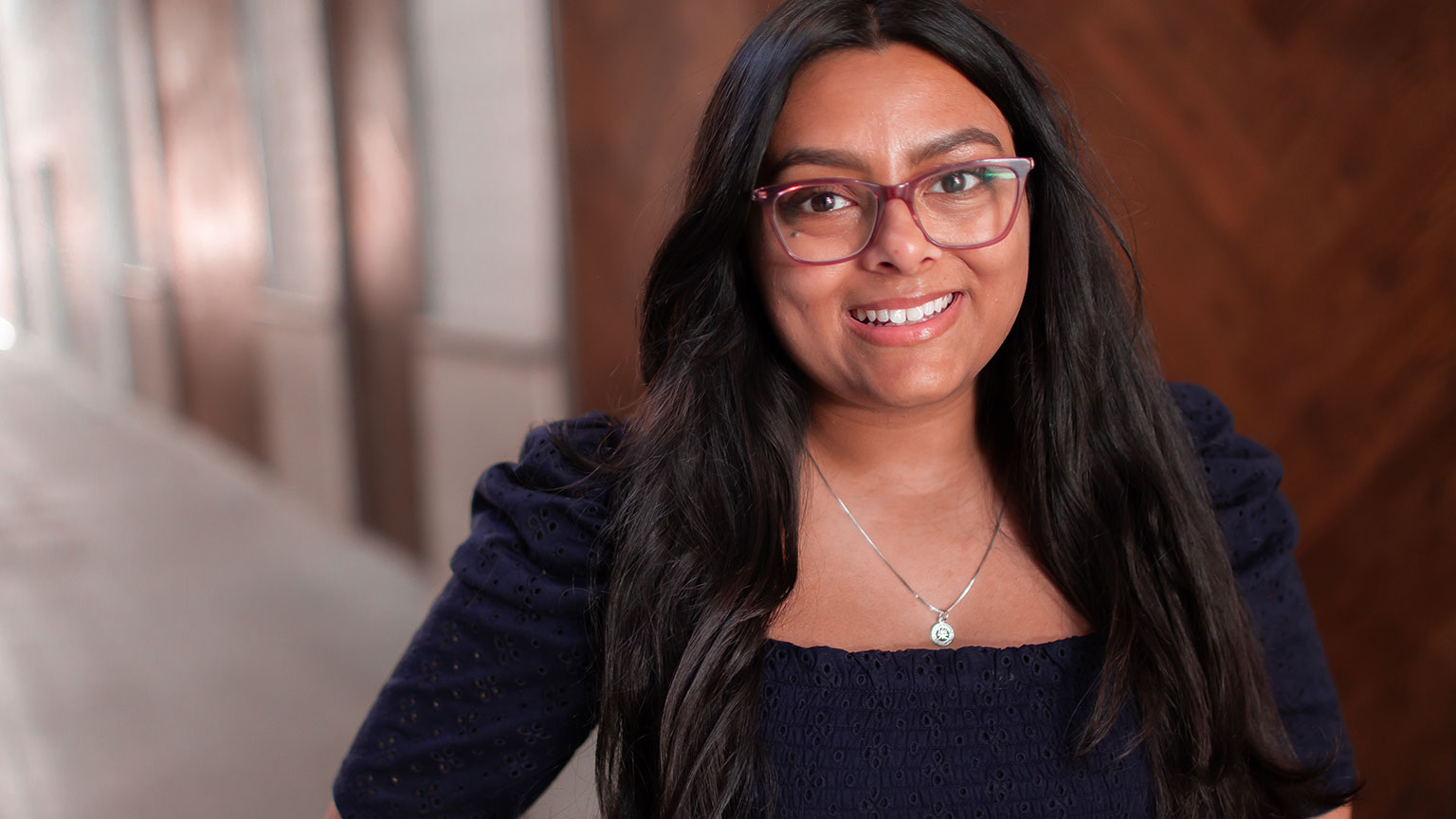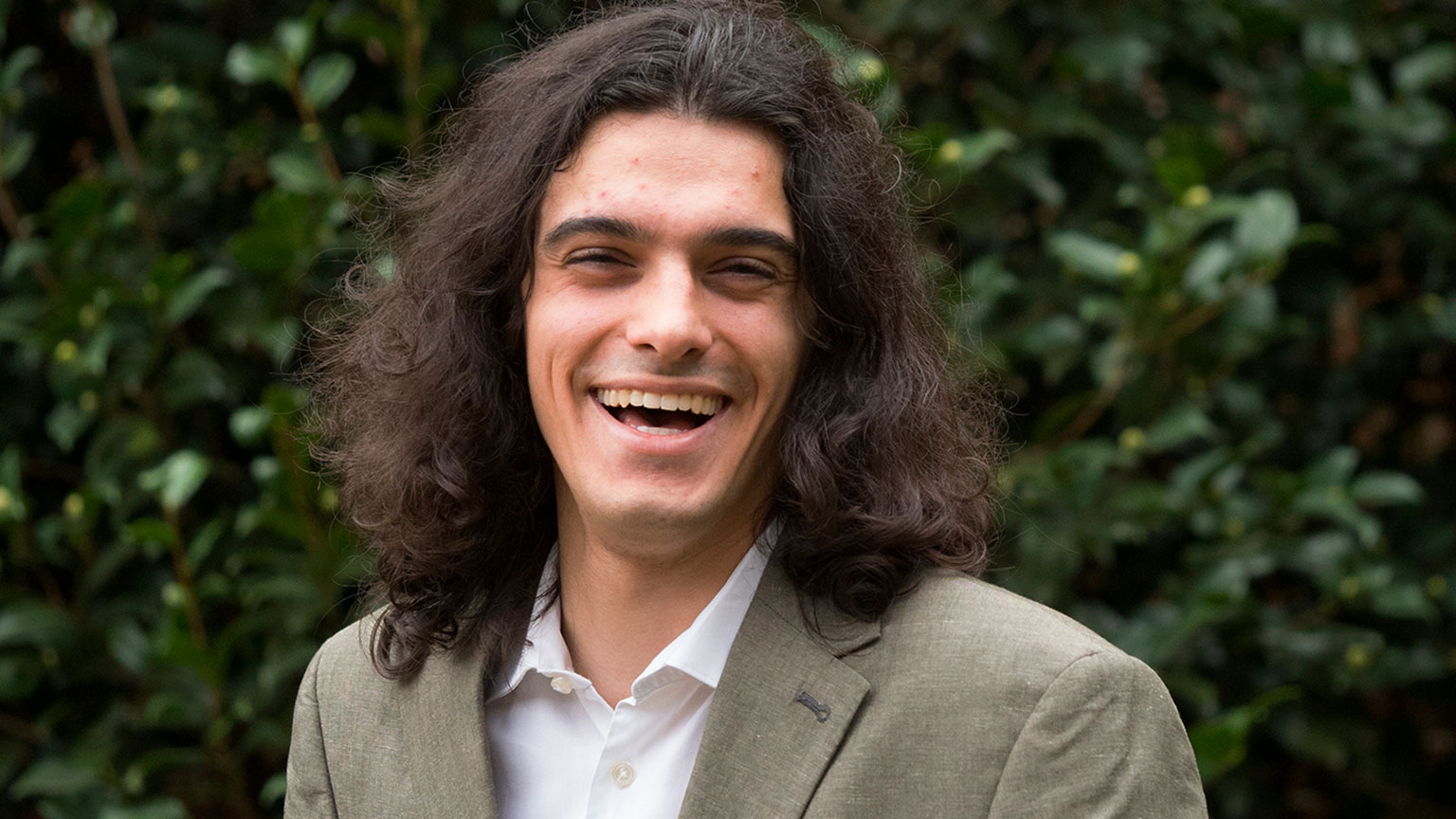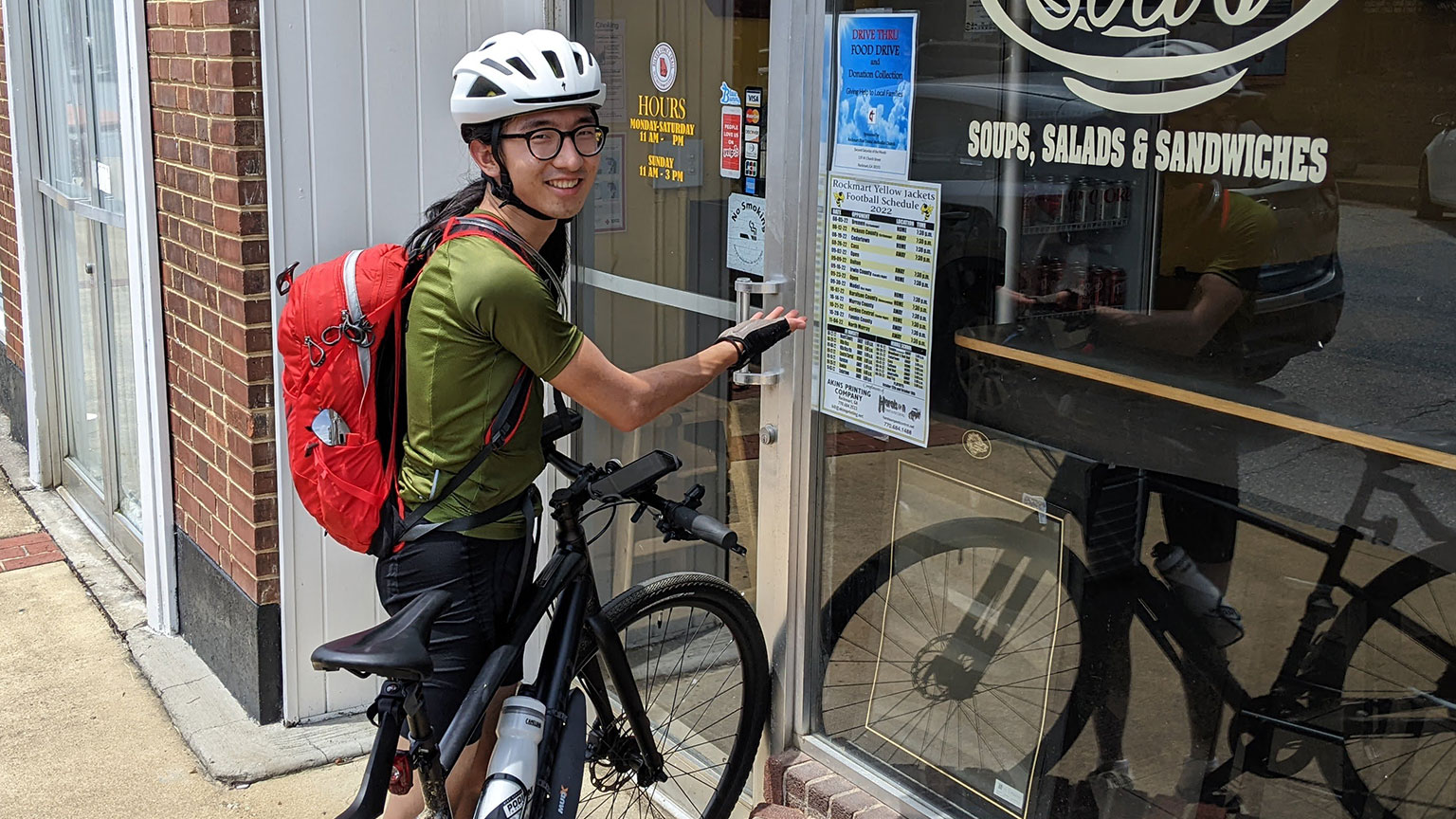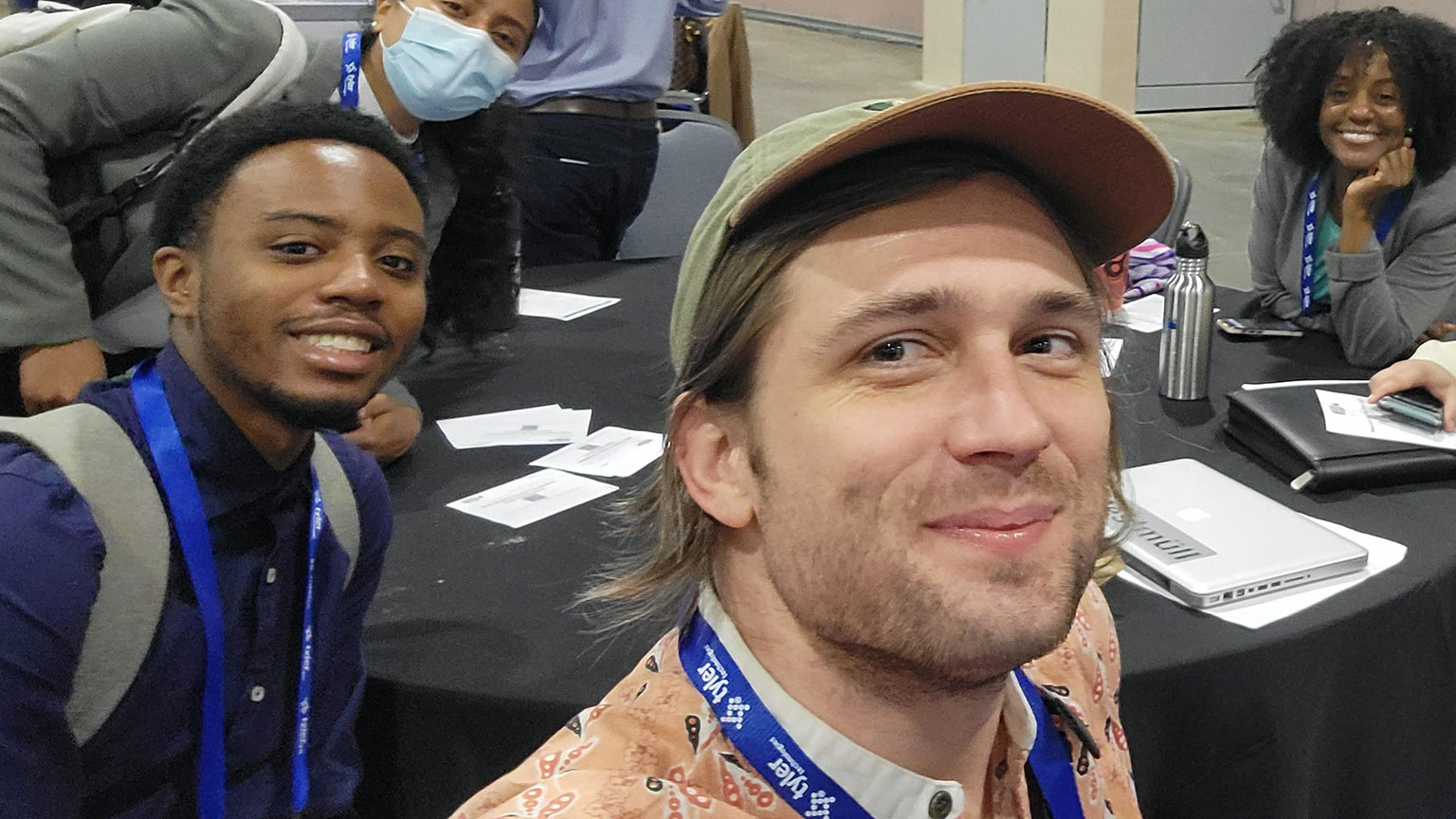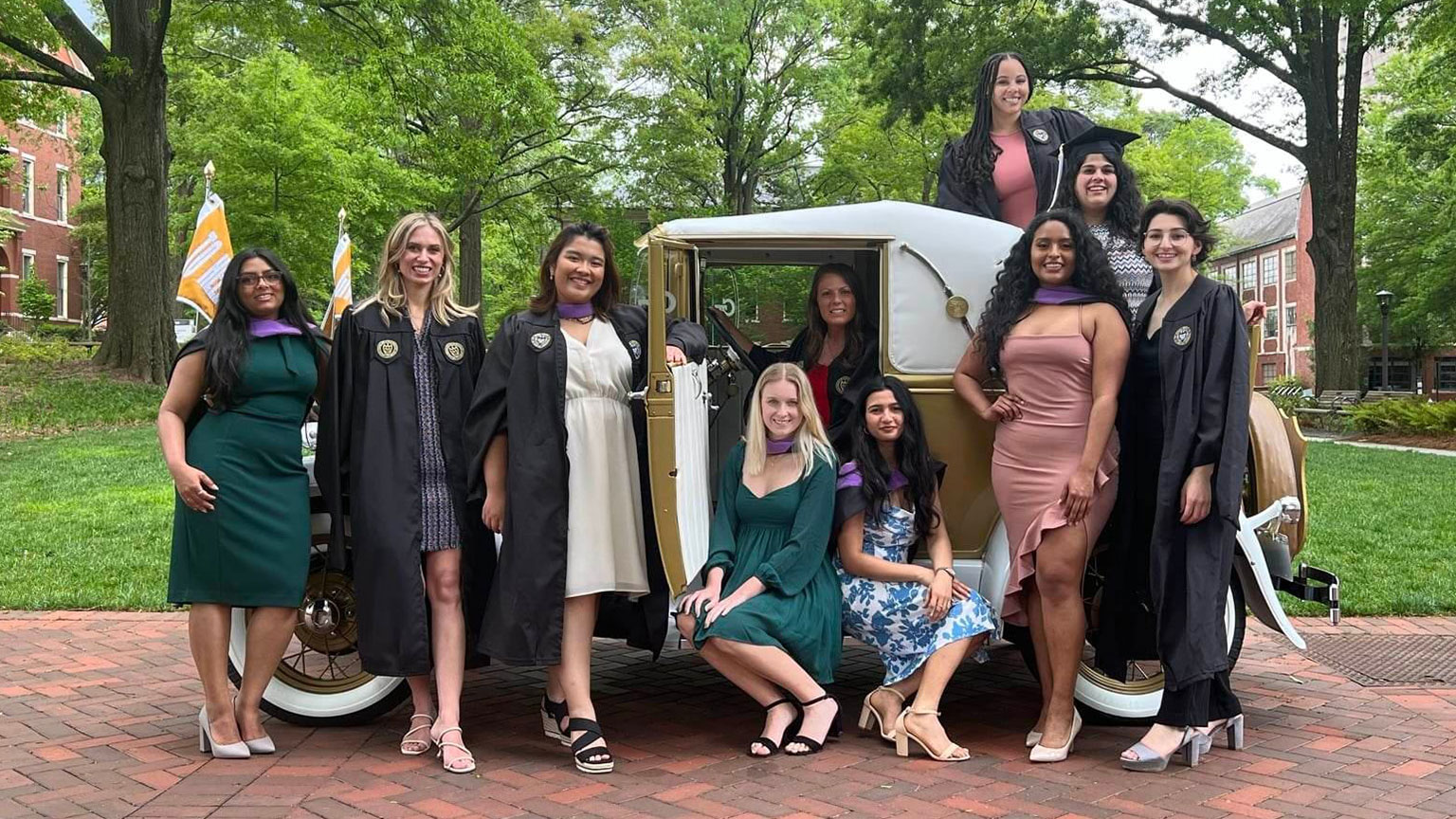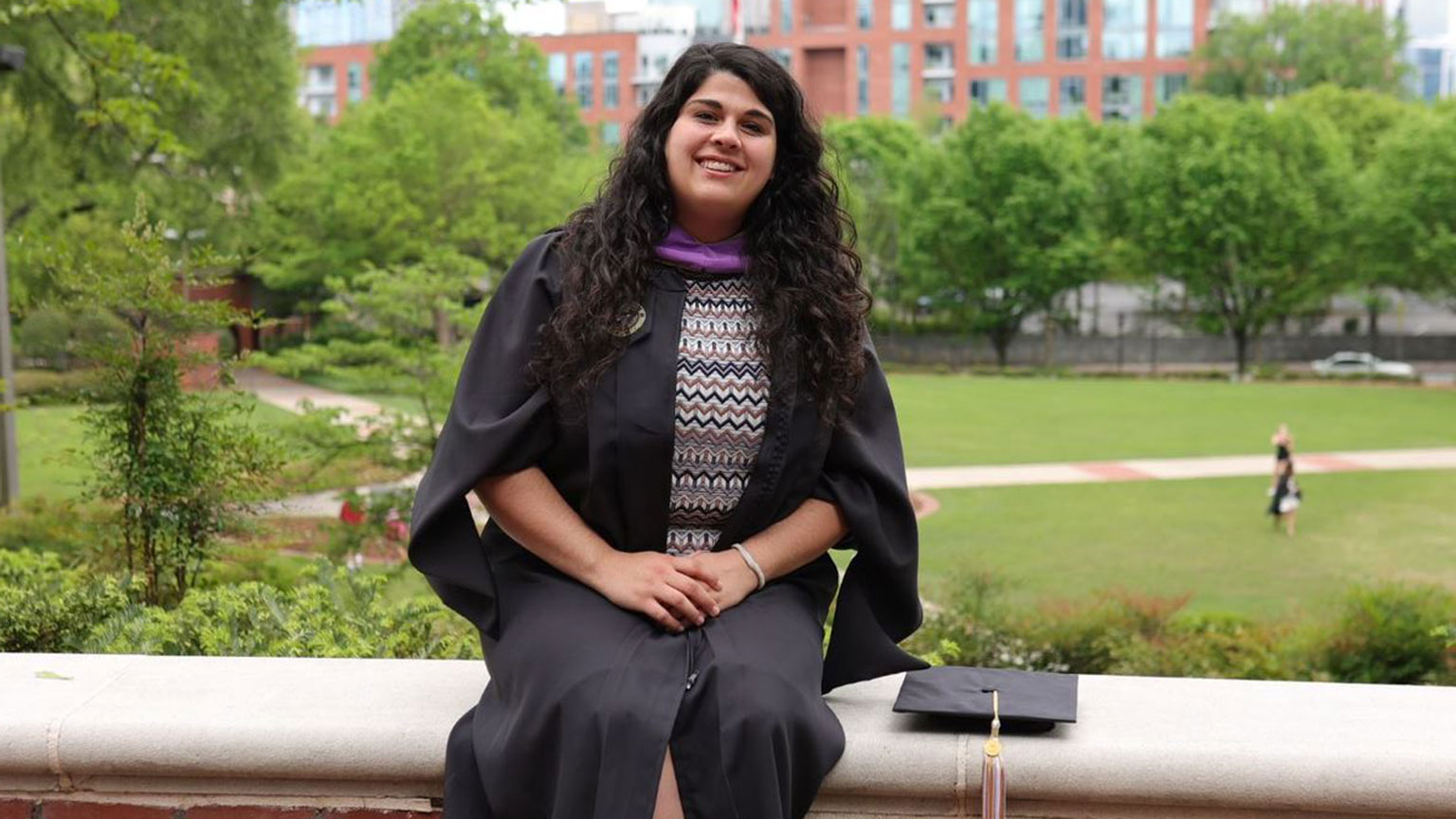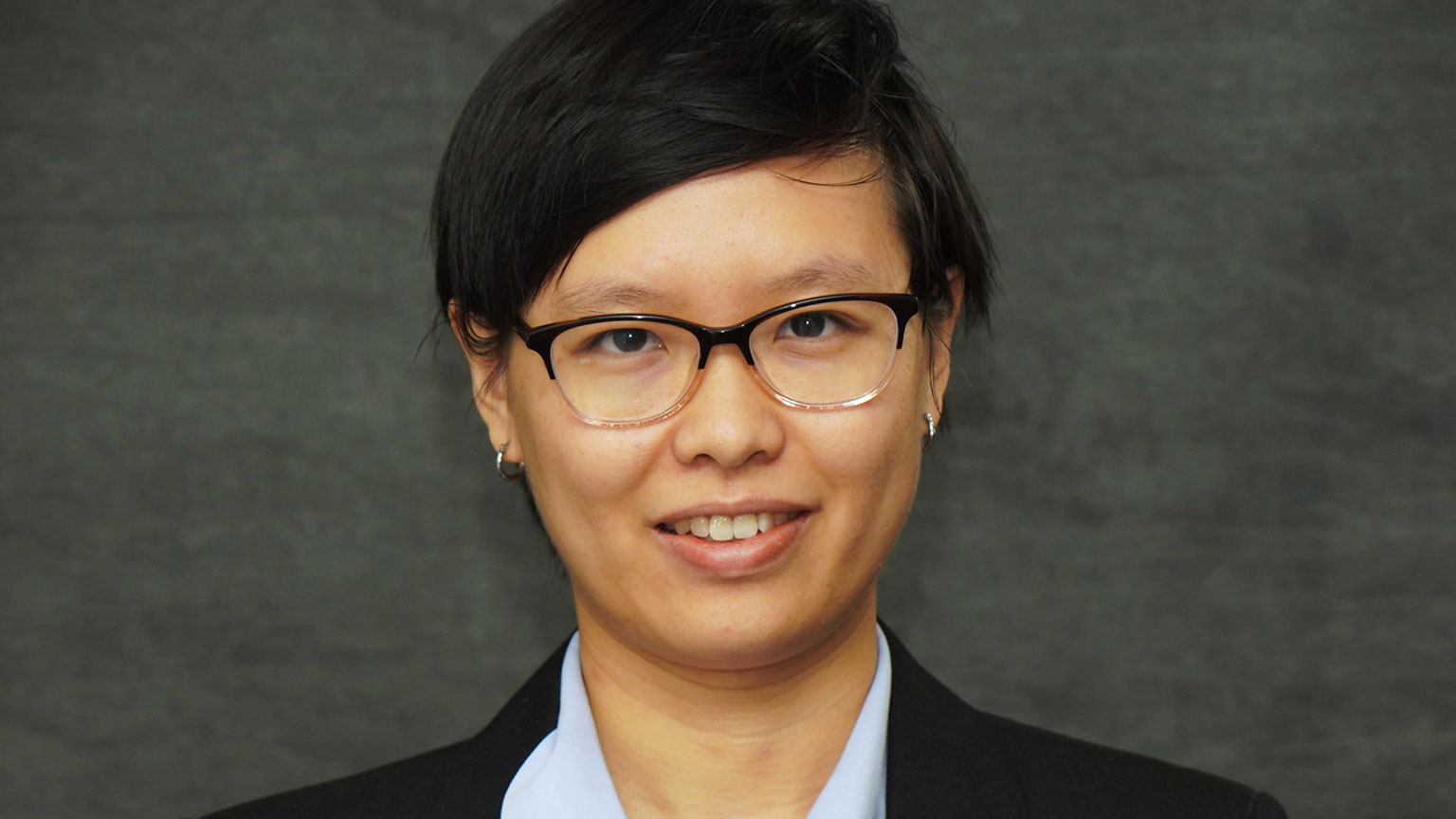Why did you choose to pursue graduate studies in this field?
Growing up, one of my primary modes of transportation was the public bus, which I would use to commute from school to my local library, the grocery store, and everything else in between. Being from Toronto, Ontario, and then moving to Roswell, Georgia, I experienced how public transit drastically differs in each city. I became aware of the necessity for public transit a much larger portion of the population than some may think, and the key to providing more of this service greatly relies on transit-oriented development. I decided to pursue my interest in transportation development through city planning as it provides a comprehensive approach to considering the impacts of transportation systems.
Why did you choose Georgia Tech/School of City and Regional Planning?
Georgia Tech's School of City and Regional Planning provided the opportunity to pursue a dual degree in City Planning and GIS. This program was important to me as my interest in planning coincides with my interest in visualizing planning-related issues. I have always believed GIS is a great tool for exploring spatial solutions for planning problems and understanding the larger picture of development projects.
Could you share what were some of the highlights of your graduate experience? What did you enjoy most? What will you miss?
Meeting my peers was the highlight of my experience at Georgia Tech. With students coming from such different backgrounds and stages in life, I was exposed to a variety of invaluable and enriching perspectives that shaped my approach to the study of City Planning. I am grateful that I was also able to form friendships with my peers as we always supported and encouraged each other, and we were able to make great memories together which is what I will miss the most. The planning community is small, so I am glad that many of us will also be able to stay in touch after graduation and even have the potential to work together down the line.
What did you find most challenging in your grad student experience?
While the classes were rigorous, the most challenging aspect of my experience here was pushing myself to think outside the box, in all aspects. I feel lucky to have been exposed to so many new people and the city of Atlanta as I have been able to learn so much about different cultures, discover my own interests, and figure out what I wanted for my career and future endeavors.
In retrospect, what advice will you give to prospective students who are considering pursuing the same field of study?
I would advise prospective students to try and find their niche in planning and assure them that this experience is not about knowing everything about planning. It is more about exploring the aspects of planning that is most interesting to them, being open to learning from their peers and experiences and taking all setbacks as an opportunity to learn and grow, whether that is from an academic or professional standpoint. This program is only two years, and you can't expect to learn everything about planning from your experience here, but take your classes and internships as stepping stones towards your objective for pursuing planning in the first place. Also if you have the chance, explore by taking some classes that you wouldn't necessarily have picked as part of your specialization or course plan, just to expose yourself to other parts of planning that you may not be familiar with.
What advice would you give to the Fall 2023 incoming class for your program?
If you are unsure of which specialization to pursue, take as many different classes as you can, and remember that your specialization doesn't necessarily have to define what you do in your planning career. Communicate your needs to your peers, academic advisors, and faculty to ensure that you can make the best of your experience here, and try to create a support system so that you don't have to bear all the weight of grad school life. I would also take advantage of the city; Atlanta has many hidden gems and it can be a truly rewarding experience if you take the time to explore inside and outside the city. Set aside time to take care of yourself and enjoy the experience while you have this chance, before heading out into the real world!
What are you looking forward to after graduation?
Since I am pursuing the dual degree program with MCRP and MS-GIST, I will be graduating in December. In the meantime, I will be working part-time as a transportation planner for a small consulting firm here in Atlanta. After graduation, I will be working there full-time, so I look forward to exploring more of Atlanta and staying connected with my friends who have also graduated.
Why did you choose to pursue graduate studies in this field?
I was interested in exploring the field of transportation from a multitude of perspectives, both traditional engineering/planning, and through new< and innovative methods such as GIS and big data applications. I've always been interested in the urban environment, and gaining an understanding of how people move and navigate within it is what ultimately led me to this field. It is an exciting time to be entering this field, as big changes in well-established practices and systems are on the horizon: I am glad to say that Georgia Tech is giving me all the tools I will need to be successful in the future!
Why did you choose Georgia Tech/School of City and Regional Planning?
I am excited to have the opportunity here at Tech to gain new skills while working on meaningful research projects and making the most of all the networking and professional opportunities provided year-round. When choosing which program to enter for grad school, I found that Georgia Tech had a good mix of all the elements I was looking for: strong, well-established programs in both City Planning and Civil Engineering, good opportunities to conduct research and an urban setting in which to test my ideas and put theory into practice. Two years in, I can say that I made a good choice, and the program has definitely lived up to my expectations.
Could you share what were some of the highlights of your graduate experience? What did you enjoy most? What will you miss?
I've really enjoyed the many opportunities to work on projects (both for classes and research) and then be able to present my work at conferences and other events (which is also a great way to network!). The City Planning program offers a great variety of GIS courses which I have greatly enjoyed and that have improved my data visualization and mapping skills. I am looking forward to the opportunity to participate in studios next year, and I am sure I will grow personally and professionally through that experience. If I were to guess as to what I might miss once I graduate, I would say that I will miss the sensation of discovery and experimentation that only research and project work can give you!
What did you find most challenging in your grad student experience?
I found it challenging to adapt to a new educational system (I studied all my life in Italy). The change from undergrad to grad school was significant, and having to balance study and work for the first time in my life was definitely tough at first. Nevertheless, I have grown a lot in the past two years, at least in part due to these initial difficulties!
In retrospect, what advice will you give to prospective students who are considering pursuing the same field of study?
If I were to give a piece of advice to a prospective student who is considering the field of transportation for further studies, it would be to get an understanding early on in your studies of how the new trends in public and private transportation might affect the industry, so as to have the time while you are in grad school to gain useful knowledge and relevant skills to prepare you for your future career. The electrification and personalization of travel promise to reshape the industry in ways we still can't fully map out, but it is worth the effort to "take a guess" and try to prepare yourself so that you can be best placed for future success. It's an exciting time to be interested in transportation, and there will be many opportunities down the road to use your skills to improve the world around you!
What advice would you give to the Fall 2023 incoming class for your program?
I would recommend getting to know your cohort well as soon as possible (this also helps with feeling less “out of place” at the beginning, which happens to everyone!). I would also make efforts to network with people who are in their second (or third) years… they will turn out to be great resources and contacts when you start looking for jobs!!! Secondly, I would recommend trying out some research. It’s a side of the world you may never come back to, so it’s a great experience to have made when it’s all said and done (and who knows, you might like it!). On that note, think of looking beyond City Planning for that kind of opportunity: Public Policy, Civil Engineering, Environmental Engineering, etc. are all schools I recommend you take a look at when looking for GRA opportunities.
What is next for you? What are you looking forward to after graduation?
I still have a year left before I graduate, but I will be looking forward to a break from classes over the summer, and getting started on the job< search come fall!
Why did you choose to pursue graduate studies in this field?
I have been practically oriented since my developmental years. While I enjoy theory, it would be even better if theories could always be implemented in real life. I see analytics as a merging of theory and implementation into real-world systems. I wanted to see real-world provable quality of life improvement in my community from the positive intentions and theories around city planning. I wanted to implement the best possible policies and systems in our city, and the application of STEM to a somewhat qualitative world seemed to be a promising avenue for improvement.
Why did you choose Georgia Tech/School of City and Regional Planning?
Throughout my undergrad, Georgia Tech has always been a place where if you can think of it, there is an avenue to make it happen. Although, there are no promises on how easy that avenue may be. SCaRP has been no exception to that. I found myself involved with SCaRP in undergrad, and discovered a unique community of students and faculty that were committed to improving our local Atlanta community and each other. When I was turned away by other schools at GT during my exploration of the urban environment, the city planning school welcomed me. How could I not want to check the school out when the people were awesome!
Could you share what were some of the highlights of your graduate experience? What did you enjoy most? What will you miss?
Studying in the student lounge and hanging out with peer students there is what I will miss the most. The staff is very passionate about the subjects they teach. I enjoyed asking questions after class or during office hours to get to the bottom of my curiosities.
What did you find most challenging in your grad student experience?
The most challenging part of my grad student experience came from being a part of a brand-new major. There were several kinks to be worked out with what class to register for, how to register for them, catching up to speed in a field previously foreign to my own, etc. While there is always an avenue at Tech, there are no promises on how easy that avenue may be. I know it would be worth it though, as Tech is always on the cutting edge. This degree program is ahead of the game and so will I and all the other students that come through this program.
In retrospect, what advice will you give to prospective students who are considering pursuing the same field of study?
Establish your priorities ahead of time and fit class, social activities, and self-care efforts around your priorities otherwise either school, the next thing coming up, or the loudest thing in your life will eat you up. At a rigorous and opportunity-filled school like Tech, you should try to have your priorities in order, or else life here will live you and not the other way around. With that said, be curious and always ask questions if you don’t understand something even if you think you will hold the class back or look stupid! Be tenacious and don’t feel discouraged when others seem to know more about a certain subject, instead, be inspired by the opportunity for growth in your future. You are competing with yourself, and everyone has a different track ahead of them. You don’t have to be an expert in everything in every class but choose what you want to delve deeper into more than the average student.
What advice would you give to the Fall 2023 incoming class for your program?
Always ask questions earlier rather than later. If you think something might be happening or should be happening, ask someone who you think might know. Many MSUA classes will make you learn new things with little guidance. Learning ability is the most valuable currency in gaining concrete skills at Tech. Practice training yourself to have an open mind on how things may work. Do not get hung up on how you think an algorithm should work, have an open mind to approaching concepts in ways you have never thought about them before. Do not get discouraged from failing once or twice; if you are tenacious, you’ll be just fine in this program.
What is next for you? What are you looking forward to after graduation?
I have thought about working in private market equity analysis, starting my own company in food tech, working back in the affordable housing analytics public sector, becoming a real estate developer, working at a homelessness non-profit, etc. Lots of different ideas in my head, but I take things one step at a time. Only time will tell. I’ll be in the right place at the right time for the right opportunity wherever I land. Something I am looking forward to is working with a good set of people in an honest effort to add value to our society and staying in Atlanta!
What keeps you going?
Know what keeps you going from day to day. Take time to be honest with yourself. Don't just do what other people do and what other people expect from you. For me, it's Jesus, but ask that question for yourself and see what pops up. If something doesn't hold up to your honest questioning don't be afraid to explore why or for something different.
Why did you choose to pursue graduate studies in this field?
I used to work in the service industry, and I can tell you that there is not a single person in any bar in any city who doesn't have a strong opinion about housing. Housing matters, and good housing matters even more. Housing is at the same time a principal site of our injustice regime - segregation, finance, property, death, life, and solidarity are all tightly bound up with how homes are organized together.
Why did you choose Georgia Tech/School of City and Regional Planning?
I had studied urban housing policy in Berlin, Germany, and knew that I wanted to refine these studies back in the United States. Atlanta was the primary attractive force behind Georgia Tech for me - and it really showed up throughout my studies. In my time at Tech, Atlanta changed the 2020 presidential election, the US Senate (twice!), the national conversation around racialized policing and resistance tactics, and more. If in Berlin I felt a world apart from the US conversation, in Atlanta I was right in the middle of it.
Could you share what were some of the highlights of your graduate experience? What did you enjoy most? What will you miss?
I've got to say that Dr. Raymond was absolutely central to my experience at SCaRP. Not only her research and teaching. She exposed me to scholars that I would not have encountered, inspired me with her approach to working with people in the city, and built a strong community of student voices around her that I got to be a part of. Her mentorship made the Tech experience for me. Otherwise, I'm so happy to have had the chance to attend five conferences in my time at SCaRP, from St. Louis to Vienna. I will miss having that structure of support. Oh, another thing is that SPA really is a great resource. I helped organize a workshop called "Comics and the City" where we invited a queer comic book artist from Finland to run a comic/zine workshop for us. We thought about urban storytelling in the medium and had a wonderful time. That was very fun!
In retrospect, what advice will you give to prospective students who are considering pursuing the same field of study?
Read a lot a lot a lot on the side. Read everything and talk about your reading with your classmates. In at least three classes, we formed reading circles to help make the required readings more social. This was very important to reduce the total time that readings took and also gave a platform for independent dialogue. Also, do not be intimidated to go talk to people far and wide. From multi-decade professionals to your neighbor on the street, just listen as much as you can.
What advice would you give to the Fall 2023 incoming class for your program?
Collectivize effort as much as possible and support each other. Practice forming networks of collective action - that can be as small as a reading group or a clean-up plan for the lounge and as big as a protest or letter to the Institute. The institute does not expect us to have a collective voice, so forming one is a source of strength. As students of Tech, the world outside will and does respect your voice. Make sure that you are honing it for good and honing it together. Get to know all of the university staff by name. Play a lot.
What is next for you? What are you looking forward to after graduation?
I am looking forward to continuing my work at the City of Atlanta formulating their housing policy plan that will hopefully empower affordable housing development and management for a decade to come. I look forward to building up a broader community of knowledge sharing through local groups and nationwide networks. I'm excited to keep trying to go to as many conferences as I can.
Why did you choose to pursue graduate studies in this field?
How our towns and communities are shaped by transportation networks has long interested me. I grew particularly interested in the transportation planning aspect of the field throughout my undergraduate studies in urban planning, which inspired me to continue my education in this discipline. I think that effective transportation planning is essential to building livable, sustainable cities, and I want to contribute to this sector by gathering knowledge and coming up with creative ideas.
Why did you choose Georgia Tech/School of City and Regional Planning?
Because of its excellent track record as one of the best programs for urban planning and transportation, I decided to attend Georgia Tech's School of City and Regional Planning. My academic and professional objectives are well-aligned with the program's interdisciplinary approach and focus on real-world applications. The school's location in Atlanta, a city renowned for its quick expansion and growth, also offers plenty of chances for practical learning and networking with professionals in the field. Overall, I have faith that Georgia Tech's School of City and Regional Planning will give me the abilities and information I need to significantly impact the fields of urban planning and transportation.
Could you share what were some of the highlights of your graduate experience? What did you enjoy most? What will you miss?
My peers in this program have truly contributed to my success in this program and they encouraged me to try and do my best. I will miss them dearly when I graduate
What did you find most challenging in your grad student experience?
The hardest part of being a graduate student was juggling my work, school, and personal obligations while maintaining a high standard of output and quality in each. Navigating the difficult academic environment and becoming used to the standards and expectations of a graduate-level school were additional challenges.
In retrospect, what advice will you give to prospective students who are considering pursuing the same field of study?
The hardest part of being a graduate student was juggling my work, school, and personal obligations while maintaining a high standard of output and quality in each. Navigating the difficult academic environment and becoming used to the standards and expectations of a graduate-level school were additional challenges.
What advice would you give to the Fall 2023 incoming class for your program?
Pick your class's research topic very carefully!!
What is next for you? What are you looking forward to after graduation?
I'm eager to investigate various employment options that suit my values and professional aspirations, whether they are in the nonprofit, public, or private sectors. Moreover, I am eager to advance my knowledge and learning through ongoing professional development, including attending workshops and obtaining new certifications.
Why did you choose to pursue graduate studies in this field?
Once I realized that urban planning takes all of the interests I have and brings them together to work for raised quality of life, I knew that I had found the career field for me. I also knew that I wanted to advance myself in this field. While my undergraduate and other work experiences had tangentially touched on issues of urban planning, I needed some way to pull them all together and I wanted to learn core technical skills to help me be successful on the job. In addition, I did not know many people working in urban planning or related fields at the time and hoped that through graduate studies I could begin to form professional networks and relationships.
Why did you choose Georgia Tech/School of City and Regional Planning?
Georgia Tech's program at the School of City and Regional Planning stood out to me for several reasons. First, I was struck by the hands-on and practical nature of the professional degree. It included a studio and internship, and several professors have ongoing labs working on real-life projects. Second, SCARP works hard to provide employment and funding opportunities for its students, whether it be through GRAs, GTAs, Co-ops, etc. This was incredibly important to me, as I could not afford to study without these working opportunities. And finally, Georgia Tech stood out for its outstanding network of graduates and its professional network.
Could you share what were some of the highlights of your graduate experience? What did you enjoy most? What will you miss?
I enjoyed so much about my experience at SCARP. The student lounge felt like a home away from home and was the site of many friendships formed. The Slack channel with all SCARP students in it has been extraordinarily helpful as a resource, and a fun place to make plans with friends as well. I am sure I will certainly miss being able to work in the lounge with so many wonderful people, all working on their own projects, but chatting together. I have also enjoyed being exposed to so many different sides and perspectives of planning -- though I wasn't able to take every class, I loved to discuss and hear about what people learned from their other classes. I most enjoyed the experience of completing an Urban Design Studio and presenting it at the National Planning Conference in Philadelphia. My teammates were superb and we are proud of our final document.
What did you find most challenging in your grad student experience?
It was challenging for me to transition from a working mentality back into a schoolwork mentality. In school work, there are always deadlines over your head and it can be exhausting to carry them around all the time. This was a huge motivator for me to re-evaluate how I organize my schedule and develop new systems for handling deadlines in my calendars. Writing the options paper was especially challenging because it is so self-led. Finishing it was certainly a proud moment and a sigh of relief!
In retrospect, what advice will you give to prospective students who are considering pursuing the same field of study?
I came into the MCRP with very little concept of what planning is and how it is accomplished. I highly suggest you meet someone who does planning and interview them about their job. Ask how their day-to-day looks, and how everything fits together behind the scenes. There are so many types of places a planner might work, and it is important you have an idea of what type of position you are looking for. That way, you can tailor all of your studies, extra-curricular, in-class projects, etc, to learn more about your preferred area!
What advice would you give to the Fall 2023 incoming class for your program?
My first piece of advice would be to create a slack channel and everyone join it! Truly, the other students you will meet will be your greatest resource and potentially a lifeline at different parts of your journey. I definitely learned as much, if not more, from my fellow peers as I did from technical courses. The second tip I would give is related-- Use this chance as an opportunity to grow not only academically, but professionally. More important than final grades will be the professional skills you developed in conflict management, networking, relationship building, and in building up your own network of friends and co-workers. Every group project is a chance to see how you work on a team, and how you can do this to more success and with different types of people. And finally, my last piece of advice is to not be afraid to find what you want to do, and then to go after it! If you have a vision or a desire to do something, when you go after it the people around you will support you!
What is next for you? What are you looking forward to after graduation?
I am currently interviewing for several positions now, and each is exciting in its own way! I am excited to start using the skills I have developed on real-life projects in cities across the US!
Why did you choose to pursue graduate studies in this field?
I traveled and studied in six different metropolitan cities around the world during my undergraduate and was fascinated by the complex mechanism that shapes the relationship between people and the built environment
Why did you choose Georgia Tech/School of City and Regional Planning?
I came to GT because my advisor got a job here at GT before I started my Ph.D.! I was also attracted to GT SCaRP because I attended the admit weekend and was impressed by the energies of the faculty, students, and the city.
Could you share what were some of the highlights of your graduate experience? What did you enjoy most? What will you miss?
I have enjoyed working with my advisor. She gave me a lot of freedom (and a lot of work) that pushed me to grow fast. I have also enjoyed my cohort of peers (PhDs and MCRPs). They have been very supportive of my research and life at GT. I am also grateful that many faculty members gave me feedback on my job applications and job talks. Overall, I have enjoyed this supportive and collegial environment!
What did you find most challenging in your grad student experience?
Say NO to work (and extra projects)! I tend to be overly optimistic and ambitious when I decided to take on projects. Yet, Ph.D. projects can be years. I later found myself struggling to find a time balance between projects.
In retrospect, what advice will you give to prospective students who are considering pursuing the same field of study?
Be the champion of your own niche and make a case for your interests! I used to be concerned that my field of interest is too unconventional (or narrow) for planning and will not land well in the job market. It turns out my unique interests distinguish me from other applicants and I end up with a job to continue doing what I like!
What advice would you give to the Fall 2023 incoming class for your program?
1) be proactive at your interests and research; 2) spend time with your peers and advisors outside of research; 3) shape your information chamber (who do you network with outside of GT?; who do you follow on social media? etc.); 4) find your work-life balance
What is next for you? What are you looking forward to after graduation?
I will be an Assistant Professor of Urban Data and Technology at Taubman College of Architecture & Urban Planning, University of Michigan - Ann Arbor, starting January 2024.
